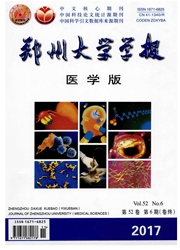

 中文摘要:
中文摘要:
目的:探讨晚期肺癌患者化疗前后血浆转化生长因子β1(TGF-β1)水平变化及其临床意义。方法:采用ELISA法检测37例肺癌患者化疗前、第1周期化疗后、第2周期化疗后及23例健康者血浆TGF-β1水平。结果:肺癌患者化疗前血浆TGF-β1水平明显高于正常对照组(Z=3.581,P<0.001)。肺癌患者不同年龄、性别、病理类型、临床分期组间比较,血浆TGF-β1水平差异无统计学意义。肺癌患者化疗2周期后,进展组血浆TGF-β1水平明显升高(t =3.067,P=0.018);部分缓解组、稳定组血浆TGF-β1水平无明显变化(P>0.05)。第2周期化疗后,以120.85 ng/L为临界值,血浆TGF-β1水平用于预测疗效的灵敏度为85.71%,特异度为63.64%[AUC(95%CI)=0.711(05.34~0.875)]。第2周期化疗后,以157.28 ng/L为临界值,血浆TGF-β1水平用于预测病情变化的灵敏度、特异度分别可达81.50%、82.76%[AUC(95%CI)=0.875(0.737~1.013)]。结论:血浆TGF-β1水平可以对化疗疗效及病情变化起到一定预测作用。
 英文摘要:
英文摘要:
Aim:To access the changes of plasma level of transforming growth factor-β1 ( TGF-β1 ) in patients with advanced lung cancer treated by chemotherapy .Methods:The plasma level of TGF-β1 was measured by enzyme-linked im-munosorbent assay (ELISA) in 37 patients with advanced lung cancer and 23 healthy control subjects.Results:The plas-ma level of TGF-β1 in patients with advanced lung cancer was significantly higher compared with normal subjects ( Z=3.581,P<0.001).No association was observed between plasma TGF -β1 levels and various clinicopathological factors in-cluding age ,gender , histology and TNM staging .After 2 cycles chemotherapy , plasma TGF-β1 levels significantly in-creased in group PD (t=3.067,P=0.018); No significant change was observed in SD group (t=0.488,P=0.634). Early prediction of disease progression was achieved with a sensitivity 85.71%and specificity 63.64%for plasma TGF-β1 level after 2nd cycle [area under the ROC curve =0.711(0.534-0.875)].Similarly sensitivity and specificity for plasma TGF-β1level after 2nd cycle were observed[area under the ROC curve=0.875(0.737-1.013)],sensitivity=81.50%, specificity=82.76%.Conc lusion:The level of plasma TGF-β1 could be a guide to predict the response of chemotherapy and disease progression in patients with lung cancer .
 同期刊论文项目
同期刊论文项目
 同项目期刊论文
同项目期刊论文
 期刊信息
期刊信息
